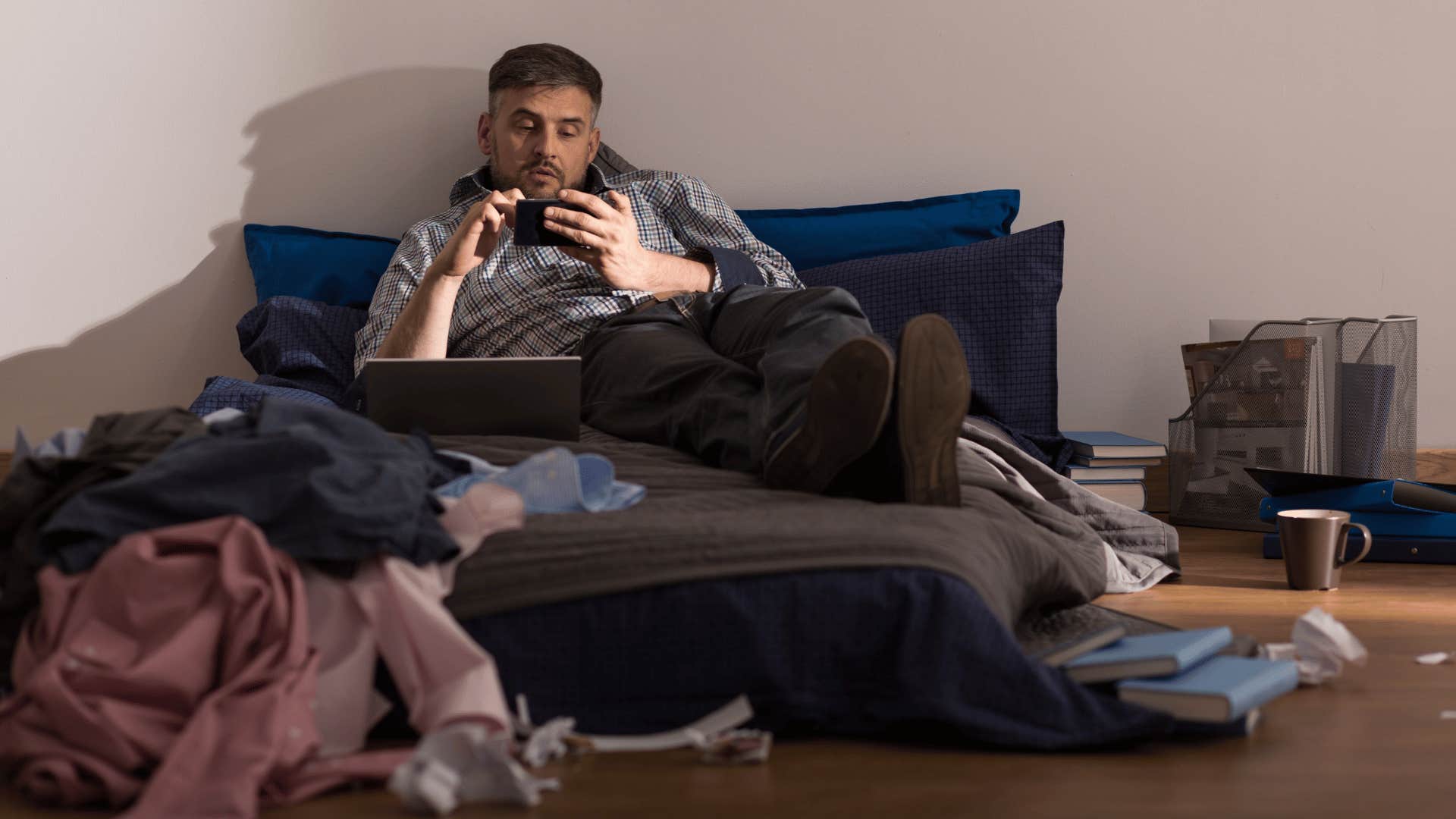It can be frustrating when one partner isn’t pulling their weight in a relationship. Maybe they haven’t washed the dishes, loaded the washing machine, or cleaned up around the house.
It’s easy for someone to think their partner is irresponsible and lazy, but sometimes the inability to do basic things is one of the major signs your partner isn’t taking good care of himself. When a man’s behavior is off, it becomes increasingly important to show up for him. And recognizing the subtle signs is the first place to start.
Here are 10 signs your partner isn’t taking good care of himself
1. He’s neglecting his personal hygiene
Srdjan Randjelovic | Shutterstock
One sign your partner isn’t taking good care of himself is if he neglects personal hygiene. Maybe he’s not showering on a daily basis or hasn’t washed his hair in weeks. Either way, it’s not a good sign.
According to registered nurse Ivory Smith, indifference to showering, combing hair, or keeping up with hygiene is typically a sign of poor mental health. Being unable to stay on top of basic hygienic practices could lead to avoidant behaviors or feelings of shame and guilt.
In your relationship, it’s important to support your partner by encouraging good hygiene. Smith suggests implementing agreements, using disposable bathing wipes, and splurging on products, which might make showering easier .
2. He makes poor nutritional choices
 Mallika Home Studio | Shutterstock
Mallika Home Studio | Shutterstock
Though there’s nothing wrong with eating junk food every now and then, not balancing it out with good, nutritious food is concerning and indicates that your partner isn’t taking good care of himself.
Unfortunately, a study from PLOS One found that high saturated fat intake led to high levels of bad cholesterol in the blood. When this occurs, it can cause heart disease in young people. Your partner’s health is the most important thing in his life, so it’s best to convince him of this truth.
He needs to put his health first by switching his diet to more nutritious foods, meal prepping, or even learning a quick and healthy recipe.
If your partner doesn’t have the energy to do this, there are plenty of foods that boost energy, but you may also consider helping him. Spending time together cooking ensures you’re not doing the bulk of the labor and is another way to incorporate quality time together.
3. He doesn’t exercise
 Trzykropy | Shutterstock
Trzykropy | Shutterstock
Many people don’t exactly make time for exercise. Between work, family, home chores, or taking college classes, staying consistent is difficult. However, never being active and always lazing around could indicate a mental health issue.
Research published in the journal Scientific Reports found that sedentary behavior exceeding 600 minutes per day was highly associated with depression. This, in turn, can make it even harder for your partner to care for himself.
Encourage him to stay active during low moments. Offer to go for a quick walk with him to move his body, even if it’s just for 10 minutes. It could be the difference between poor health and improved well-being.
4. His sleep schedule is irregular
 Prostock-studio | Shutterstock
Prostock-studio | Shutterstock
An irregular sleep schedule is a glaring sign your partner isn’t taking good care of himself. He may toss and turn all night long, waking up the next day exhausted. Unfortunately, this can lead to poor academic or work performance if he doesn’t have the energy to perform his daily tasks.
During moments like these, set an example. If you’re going to sleep late, you can’t expect your partner to sleep early. This is where good sleep hygiene can help.
According to the Sleep Foundation, sleep hygiene is the healthy habits and environmental factors in people’s lives that impact their sleep quality. For better sleep hygiene, the Sleep Foundation recommends getting daily sunlight, refraining from smoking, keeping a consistent routine, and using your bed only for sleep. By getting into a routine, you’ll find that your partner is increasingly willing to do the same.
5. He doesn’t socialize with others
 Inside Creative House | Shutterstock
Inside Creative House | Shutterstock
Even if your partner is an introvert, not socializing or participating in social activities is a bad sign. If his friends call asking to hang out, he might flake at the last minute or never text back. And constantly staying indoors might lead to isolation, which could cause further problems down the road.
According to research from Perspectives in Psychological Science, isolation leads to an increased risk of mortality. A lack of social connection is as dangerous as smoking 15 cigarettes a day. Men today also are experiencing a loneliness epidemic, further showing just how important it is for your partner to be out in the world.
While throwing your partner into a big party certainly won’t help, encouraging them to accompany you out is a good place to start. You can go out to eat, go grocery shopping, or even take a nice stroll. Slowly find ways to get him out of the house, and as he grows used to it, he will find it easier to accept invitations and be more active.
6. He neglects his responsibilities
 Jelena Zelen | Shutterstock
Jelena Zelen | Shutterstock
It’s a concerning thing if your partner is neglecting his responsibilities. Things like cleaning, going to work, and paying bills on time are all non-negotiables. Unfortunately, when he isn’t taking good care of himself, your partner may be suffering from some kind of mental health condition, especially if they find it difficult to even get out of bed in the morning.
If your partner is neglecting his responsibilities, try to find ways to make his everyday grind enjoyable. For instance, he might have to get up in the morning but at least he has his favorite breakfast to look forward to. Or, he needs to go to work, but has plans with you to look forward to after hours.
Finding ways to make these daily experiences enjoyable can help instill gratitude and positivity into your partner’s life. And that makes it easier for him to take care of himself.
7. He’s moody
 Ekateryna Zubal | Shutterstock
Ekateryna Zubal | Shutterstock
In life, we all have good days and bad. But if your partner isn’t taking good care of himself, he may be hot and cold on a daily basis. He might snap at you, cause issues at work, or get into altercations with complete strangers. It indicates a potential anger problem or mental condition.
According to research from Frontiers in Psychiatry, people who exhibit intense emotions constantly are increasingly likely to have depression than people who are simply sad. This finding shows the importance of getting your partner the help he needs; otherwise, his mood swings can impact his well-being and your relationship.
8. His surroundings are messy
 Ground Picture | Shutterstock
Ground Picture | Shutterstock
Though it’s normal for rooms to get messy, if your partner refuses to clean his room or keep the house tidy, he’s not taking very good care of himself. More than likely it can be an indicator that he’s suffering from depression.
Though it might be a pain, it’s important to remain positive during this period. Finding ways to make cleaning fun is a great place to start. For instance, offering to clean together while listening to music or watching his favorite show is encouraging. Cleaning in bursts is also a good way to get him into the habit. Maybe it’s cleaning for 30 minutes at a time instead of spending the whole day tidying up.
It might take a while, but slowly he can get into the habit of doing things himself. Just be patient and understanding as he relearns how to take good care of himself.
9. He’s on his phone constantly
 Antonio Guillem | Shutterstock
Antonio Guillem | Shutterstock
It might frustrate you to see your partner on his phone all the time. It may make you feel disrespected or unappreciated. But he may be using his phone to avoid reality. He could feel stuck in life, and scrolls through his social media feeds to escape the complicated emotions swirling around inside of him.
Pull your partner to the side to sit down and discuss your concerns with him. Agree on a time when phones are off-limits. Perhaps it’s when you’re cooking dinner together or are spending quality time on the sofa. During no phone time, reconnect with your partner. It’s a great way to help him get back on track.
10. He’s given up on his hobbies
 TetianaKtv | Shutterstock
TetianaKtv | Shutterstock
Hobbies are a great way for someone to express and ground themselves. But if your partner has given up on his hobbies or lost interest in them altogether, it’s a sign he isn’t taking good care of himself.
According to a study published in European Child & Adolescent Psychiatry, losing interest in hobbies is a sign that someone is severely depressed. Known as anhedonia, this is when someone loses interest and pleasure in everything. But the symptoms don’t stop there; researchers found that this extends to loss of motivation and sense of connection.
If this is the case with your partner, it’s a good idea to seek a professional opinion for help. There isn’t much you can do if your partner has reached this stage aside from bringing in professional help. But you can help by staying positive and encouraging him along the way.
Marielisa Reyes is a writer with a bachelor’s in psychology who covers self-help, relationships, career, family, and astrology topics.




